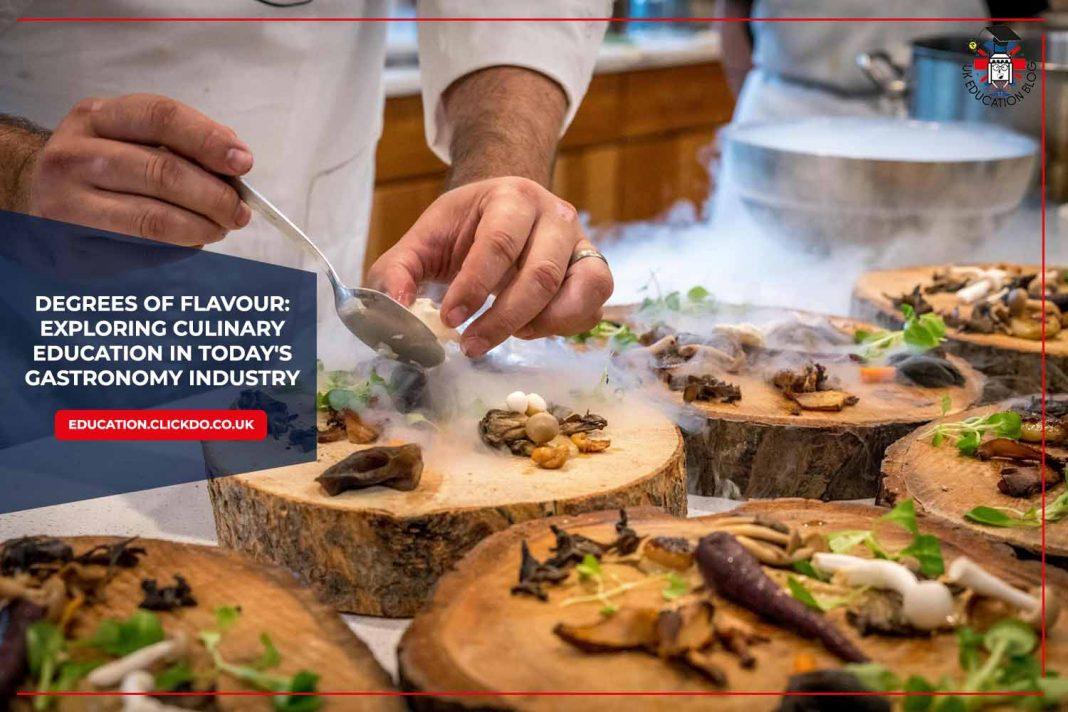Have you ever wondered what it takes to transform a passion for cooking into a distinguished career in the culinary arts?
With the ever-evolving landscape of the food industry, how can aspiring chefs and food enthusiasts navigate their educational paths to achieve culinary excellence?
Join us on a flavourful journey through the intricate layers of culinary education, where every lesson is a step closer to mastering the art of cooking.
Unfolding the Curriculum
Embarking on a culinary education journey immerses you in a diverse curriculum designed to hone your gastronomic prowess.
Degree Programs Overview
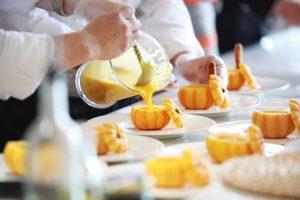
You’ll discover a variety of degree programs tailored to your culinary ambitions. Whether you aspire to be a chef, a pastry artist, or a restaurant manager, each program offers a structured path with specific courses to guide your professional growth.
In culinary education, degree programs are designed to cater to various interests and career goals within the culinary and hospitality industries.
Here’s an overview of some specific degree programs available:
Associate Degree in Culinary Arts
This is typically a two-year program that provides foundational knowledge and practical skills in cooking and kitchen management. Students learn about food preparation, cooking techniques, kitchen safety, and sanitation. This degree is suitable for those aiming to become professional chefs or kitchen managers.
Bachelor’s Degree in Culinary Arts Management
This four-year program combines culinary skills with business management education. Students not only learn about cooking and food preparation but also study topics like hospitality management, business finance, and marketing. This degree is ideal for individuals looking to enter management roles in restaurants, hotels, or food service companies.
Associate/Bachelor’s Degree in Baking and Pastry Arts
These programs focus on the art of baking and pastry making, teaching students to create breads, cakes, chocolates, and other desserts. Courses often include pastry techniques, chocolate art, and sugar work.
Graduates can pursue careers as pastry chefs, chocolatiers, or bakery owners. A comprehensive program in baking and pastry arts at a renowned French pastry school in France can transform your love for desserts into expertise with a special French flair.
Master’s Degree in Culinary Management
Aimed at those who already have experience in the culinary field, this advanced program focuses on leadership and management skills in a culinary context. Topics might include advanced culinary techniques, business strategy, and hospitality management. This is suitable for those looking to continue their education and hold executive positions in the culinary industry, such as executive chefs or restaurant managers.
Diploma in Culinary Arts
This is a shorter program compared to a degree and is focused on intensive culinary training. Students learn essential cooking methods, kitchen management, and basic food preparation skills. This program is suitable for individuals looking for a quick entry into professional cooking.
Specialty Programs
Many culinary schools offer specialised programs such as vegan culinary arts, molecular gastronomy, food styling, and culinary nutrition. These programs allow students to focus on niche areas of interest within the culinary field, enhancing their expertise and opening unique career opportunities.
Each of these degree programs includes a mix of theoretical study and practical training, often with internships or apprenticeships in real-world culinary settings. This comprehensive approach ensures that graduates are well-equipped to meet the demands of the culinary industry.
Enhancing Culinary Expertise
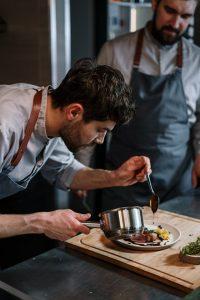
A culinary education equips you with a rich palette of skills that range from the delicacy of pastries to the science of nourishment.
With the right program, you will be prepared to excel in the dynamic world of gastronomy.
Taste and Sensory Analysis
Delving into taste and sensory analysis equips you with the ability to discern subtle flavours and aromas. This crucial skill set includes:
- Understanding the science of taste
- Identifying flavour components
- Utilising sensory description techniques
Your career in the culinary field will be enriched by these refined tasting abilities, allowing you to create nuanced and well-balanced dishes.
Ingredient Mastery
Mastering ingredients means knowing their history, varieties, and applications. You’ll learn sustainable sourcing, seasonality, and storage techniques to elevate your cooking. Ingredient mastery is integral for chefs, enabling them to select the perfect produce and proteins for every dish.
Cooking Techniques
Fundamental and advanced cooking techniques form the bedrock of your culinary expertise. From sautéing to sous-vide, you’ll practise hands-on in professional kitchens, gaining proficiency in:
- Wet and dry heat cooking methods
- Precision cuts and presentation skills
- Utilising modern kitchen equipment Proficiency in these techniques ensures you’re well-prepared for the heat and demands of a working kitchen.
Culinary Nutrition and Dietetics
As health consciousness rises, you’ll learn how to fuse flavour with nutrition, analysing the nutritional content of dishes and adapting recipes for various dietary needs. By mastering culinary nutrition and dietetics, you’ll cater to a broader palate and promote healthier eating habits among your clientele.
Blending Theory and Practice
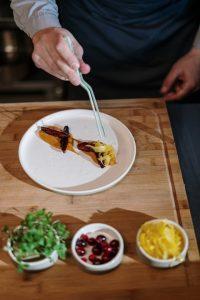
In culinary education, the harmony between learning from textbooks and applying knowledge in a kitchen is essential for your growth as a chef. These subsections explore how theoretical knowledge is integrated with hands-on experience.
Interactive Learning
Participating in interactive learning paves the way for a strong grasp on culinary concepts. Through engaging discussions and activities, you can absorb food science principles that later translate into your cooking techniques.
Apprenticeships and Internships
Apprenticeships and internships give you the invaluable opportunity to work alongside professionals. This on-the-job training exposes you to real-world kitchen dynamics and refines your skill set through practical application.
Kitchen Laboratory Work
Kitchen laboratory work is crucial for honing your techniques. In these controlled environments, you experiment with recipes, understand ingredient interactions, and learn the precision required for impeccable dish execution.
Live Cooking Sessions
Engaging in live cooking sessions offers immediate feedback on your culinary creations. Executing dishes under time constraints helps build your agility and confidence in the kitchen, preparing you for the pressures of the culinary industry.
Future Horizons
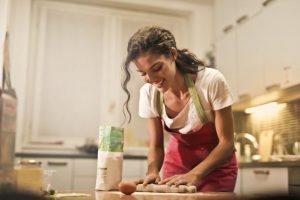
As you embark on a journey through culinary education, it’s essential to recognize how the evolving landscape will shape your culinary journey.
Innovations and Technology
The culinary world is continually enhanced by cutting-edge technology. Expect to see smart kitchens where appliances are interconnected, and AI-driven cooking assistants offer real-time guidance. Food 3D printing may soon enable complex food designs that were once impossible. Hands-on experience with these tools can set you apart in the industry.
- Smart Kitchen Tools: Wi-Fi enabled devices, automated inventory.
- AI in Culinary Arts: Personalised recipe creation, flavour pairing.
Sustainable Cooking Practices
Sustainability is not just a trend; it’s a commitment to our future. Your culinary practices will be deeply influenced by locally sourced ingredients, zero-waste cooking, and energy-efficient kitchens. Mastery of these practices reflects not only on your culinary skill but also your dedication to environmental responsibility.
- Local Sourcing: Farmers’ markets, community gardens.
- Zero-waste Techniques: Composting scraps, full utilisation of ingredients.
Global Cuisine Influence
The richness of global cuisines offers endless inspiration for innovation in your craft. As you explore culinary education, you’ll dive deeper into ethnic cooking techniques and flavour profiles. Embracing this diversity can inspire original creations and fusion dishes, making your culinary repertoire truly unique.
- Ethnic Techniques: Authentic spice blends, and traditional cooking methods.
- Flavour Exploration: Fusion dishes, international ingredients.
Culinary Journey Concluded: Savouring the Path to Mastery
Embarking on a culinary education journey is a rich and fulfilling endeavour that offers more than just learning how to cook. It is about embracing the art and science of gastronomy, understanding the subtleties of taste and sensory analysis, mastering a diverse array of ingredients, and perfecting cooking techniques that range from traditional to cutting-edge.
By choosing the right educational path and immersing oneself in the comprehensive curriculum that culinary schools offer, students can transform their passion for food into a thriving career. Ultimately, the journey through culinary education is not just about the dishes one learns to create but about becoming a part of the ever-expanding global culinary narrative, contributing to a future where food is celebrated as both an art and a necessity.
Author Profile

- Shirley Owen is a blogger and writer who enjoys writing blogs on education, technology and general news. An avid reader, she follows all the latest news & developments to report on them through her articles.
Latest entries
 learningDecember 22, 2025When Co-parenting Affects School Performance – Challenges & Solutions
learningDecember 22, 2025When Co-parenting Affects School Performance – Challenges & Solutions educationDecember 11, 2025Making Education Accessible for Mobile Families that Travel
educationDecember 11, 2025Making Education Accessible for Mobile Families that Travel learningOctober 28, 20257 Daily Classroom Strategies Helping Children With Learning Differences Thrive
learningOctober 28, 20257 Daily Classroom Strategies Helping Children With Learning Differences Thrive  educationSeptember 18, 2025A Guide to the European Accessibility Act for Schools and Universities
educationSeptember 18, 2025A Guide to the European Accessibility Act for Schools and Universities


